Human Rights

Beau Underwood reminded us at this year’s Sojourners’ Christmas chapel that Jesus was not born into a calm, peaceful world in a serene nativity scene. It was a chaotic world in which the Jews were oppressed by Roman rule and Jesus’ very act of being born freaked Herod out, resulting in a mass genocide of baby boys. All was not calm and peaceful as the birth of Jesus challenged the sinful powers and structures of the world from the very start of his life.
This Christmas the world remains a very frightening and chaotic place for many children around the world. Jim Wallis and I met with former U.K. Prime Minister Gordon Brown just a few days ago and Gordon told us about a group of children in Delhi, India who were being held in unspeakable conditions — forced to work for up to 15 hours a day making Christmas decorations.
Children! Forced slave labor, some of them as young as 8 years old, imprisoned, beaten, and required to make decorations intended celebrate the birth of the savior of the world. Making matters worse, these are only a few of millions of young children trafficked into slave labor around the world all year long. What horrible irony.
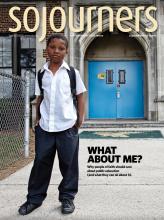
HOW TO MAKE schools work for all children is a hot topic these days—and a vital one for people of faith called to love our neighbors. While the vast majority of private schools are faith-affiliated, nearly 90 percent of U.S. children attend public schools. Their quality is key to the common good.

Editor's note: This essay has been adapted from Gender Balancing our World.You can read the full article HERE.
We had barely gobbled down our last bite of turkey and pumpkin pie before the familiar lines of carols began to ring in our ears and warm our souls. Joy to the world! Peace on earth! Good will to all! Let heaven and nature sing! I don't know about you, but as I string up lights, pull out the advent wreath and boxes and boxes of ornaments and tangled lights, the lofty words of our beloved carols have a way of triggering a paradoxical mix of joy, generosity, and enlarged spiritual vision, yet also a fairly predictable malcontendedness about the state of things.
How strange it is that Christmas carols can make me want both to buy an iPhone 5 and a Mac Airbook and in the same moment want to save the world? I admit that I keep Santa’s Amazon elves very busy this time of year, yet in quiet moments the contradictions between the high ideals of the season and the harshness of our egregiously unjust world nag at my soul.
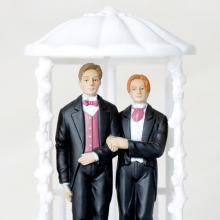
CANTERBURY, England — The British government unveiled a proposal on Tuesday that excludes the Church of England and the Church in Wales from planned legislation to allow same-sex couples to marry in churches.
Culture Secretary Maria Miller told Parliament the new plan would allow gay and lesbian couples to marry in some churches, synagogues, temples, and mosques, but definitely not in the established church, where both the outgoing and incoming archbishops of Canterbury insist that marriage remain between a man and a woman.
"We will write on the face of the bill a declaration that no religious organization, or individual minister, can be forced to marry same-sex couples or to permit this to happen on their premises," Miller told the House of Commons.
Religious groups, including Quakers, Unitarians, and some liberal Jewish groups, welcomed the news because they favor same-sex marriage. The Church of England, the Church in Wales, the Roman Catholic Church, most Muslims, and Orthodox Jews oppose the move.

NEW YORK — The ancient dream of making money by simply moving money took a hit last week when Citibank announced plans to lay off 11,000 workers.
Across town, the dream of making money by actually making things – a dream that had seemed lost to foreign labor – got a boost when Apple's boss Tim Cook announced plans to make some computers in the U.S.
Citibank's move sent shock waves among people educated to take meetings, crunch numbers, and parlay networking into fees for passing money through their hands. There's no actual creation of wealth; just dipping a large ladle into wealth as it flows past.
Apple's small and somewhat symbolic move, by contrast, stirred hope that manufacturing might return again to American shores and stimulate the manufacturing wages and productive attitudes that once built a middle class.
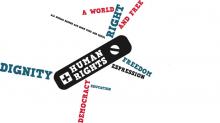
Carolyn Winfrey Gillette wrote this hymn in celebration of Human Rights Day (December 10), the anniversary of the adoption of the Universal Declaration of Human Rights.
Seven years later, on Dec. 5, 1955, the Montgomery Bus Boycott began with 40,000 African-Americans walking, bicycling or car-pooling to pressure the bus company for change. The boycott ended in victory after 381 days. December is a good month to remember past work for justice and to work for it today as we celebrate the one who came “to give light to those who sit in darkness and in the shadow of death, to guide our feet into the way of peace" (Luke 1:79).

NAIROBI, Kenya — Nobel Laureate Archbishop Desmond Tutu on Tuesday urged Uganda to scrap a controversial draft law that would send gays and lesbians to jail and, some say, put them at risk of the death penalty.
The Anti-Homosexuality Bill is expected to become law after Parliamentary Speaker Rebecca Kadaga offered it to Ugandans as a "Christmas gift." The bill is believed to exclude the death penalty clause after international pressure forced its removal, but gay rights activists say much of it is still horrendous.
“I am opposed to discrimination, that is unfair discrimination, and would that I could persuade legislators in Uganda to drop their draft legislation, because I think it is totally unjust,” Tutu told reporters here on Tuesday at the All Africa Conference of Churches meeting.

CANTERBURY, England — The Church of England plans to rush through legislation to consecrate women bishops after last week’s surprising defeat at the church's General Synod in London.
The church's Archbishops’ Council ended two days of closed-door meetings on Wednesday (Nov. 28), and said a plan to allow women bishops needs to be "restarted" when General Synod reconvenes in July. Church leaders originally said the issue could not be reopened until 2015.
The 19-member council acts as the standing committee of the three-tier General Synod made up of bishops, clergy and laity.
Sojourners President and CEO Jim Wallis joined voices worldwide rallying in the fight against AIDS. The ONE Campaign — an international nonprofit focused on global health and poverty issues — today launched its "It Starts With Me" video campaign.
DOES THE RIGHT to free speech include the right to yell “Fire!” in a crowded social network?
That’s one of the questions raised by the violent overreaction by some Muslims to the 14-minute YouTube video clip, Innocence of Muslims.
Of course, my question paraphrases the words of Supreme Court Justice Oliver Wendell Holmes in deciding that speech likely to cause immediate violence could be restricted. However, over the course of the 20th century, the American standard for limiting potentially harmful speech has gotten a lot tougher. For the past 50 years or so, it’s been settled law in the U.S. that the First Amendment protects speech that is, like Innocence of Muslims, false, hateful, malevolent, and even very badly written, acted, and produced. But the Internet Age is bringing new challenges to America’s free-speech fundamentalism.
Tolerance of blasphemous, racist, and defamatory material is commonplace to most Americans. We take it as one of our God-given rights. But, in fact, this is a real example of American exceptionalism. No other liberal democracy in the world protects speech that is plainly intended to wound and insult members of a specific racial or religious group. “Hate speech” prohibitions are the rule throughout the Western world.

A TRADITIONAL whale-oil lamp is solemnly lit by an Inuit elder. After being brushed with cedar and smudged with sage, three commissioners take their seats. A survivor begins his testimony, haltingly narrating painful memories from 60 years ago. Soon tears begin to flow, and a support person carefully collects the tear-soaked tissues into a basket, to be added to the sacred fire that burns outside the hall. In this space, so filled with sorrow and rage, every ritual communicates respect, empathy, and determination, turning public halls into sanctuaries of healing.
For seven generations Indigenous Canadian children were taken from their homes and sent, most often by force, to Indian Residential Schools. Churches began operating these schools in the early 1860s, and by the 1890s the federal government had begun to make attendance mandatory as part of a policy of assimilation into Canadian society. In these schools children were forbidden to speak their native languages, forced to conform to European ways of life, and often abused emotionally, physically, and sexually. Though most residential schools were closed by the mid-1970s , the last was not shuttered until 1996.
As part of a 2007 legal settlement with survivors, the Truth and Reconciliation Commission of Canada (TRC) was created, with a five-year mandate to document the testimony of survivors, families, and communities affected by the residential school experience and to inform all Canadians about this tragic history. Launched in Winnipeg in June 2010, the TRC will include seven national and a number of regional hearings throughout the country. The hope is to “guide and inspire Aboriginal peoples and Canadians in a process of reconciliation and renewed relationships that are based on mutual understanding and respect.”
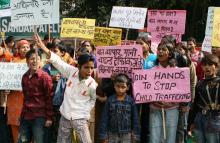
The Disease: Modern Day Slavery
Human trafficking is a worldwide enterprise in the 21st century. In the United States, USAID has reported that between 12 and 27 million people are victims of human trafficking worldwide.
Even in our American society, men and women are being sold and traded for labor or sexual purposes every day. According to the Freedom Center, three out of every four victims are female and nearly half of modern-day slaves are children. It is hard to imagine that this problem could go unnoticed for very long. The good news is that on Sept. 25, the president took notice of the disease that affects 17,500 American people each day.
President Barack Obama stated that slavery, “is barbaric and is evil, and it has no place in a civilized world.”
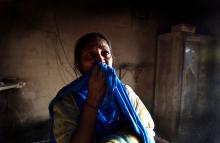
When the United States dropped atomic bombs on the Japanese cities of Hiroshima and Nagasaki in 1945, the world was ushered into a period of weapons paranoia. The Cold War, of course, was hallmarked by the obsessive weapons one-upmanship of the United States and the Soviet Union.
Who, then, would have thought that in the 21st century, the seeming weapon of choice would not be some sort of super-nuclear missile or an ultra-deadly biological toxin, but that it would, instead, be women?
“Women are being used as weapons of terror,” Dr. Rubina Greenwood told an audience last week at a congressional briefing on the rights of minority women in Pakistan organized by the Hindu American Foundation.

NEW YORK — Former Sen. George McGovern was a friend to anyone who is concerned about the issue of hunger and malnutrition in the world.
As the one-time United Nations Ambassador to the Hungry, McGovern had always made battling hunger a top concern, even when the political winds did not favor that fight as a topical concern. But, unfortunately, as he knew better than anyone, hunger and malnutrition still must command our attention.
McGovern's death on Sunday at age 90 is indeed a sad moment for our nation, regardless of political persuasions. McGovern was someone who cared very deeply about people, cared about issues of injustice, cared about brokenness. He was committed to using the strength of his public service to bring healing and reconciliation.
I recall being with him in 2002, when he delivered a keynote address to some of our staff from Church World Service who were meeting in Daytona Beach, Fla. He was a huge supporter of our nationwide CROP Hunger Walks, which raise funds and awareness for food programs here in the U.S. and around the globe.
His talk anticipated our organization's plans for a multi-year Campaign to End Child Malnutrition in Africa.
"I hope someday we will be able to proclaim that we have banished hunger in the United States," he said, "and that we’ve been able to bring nutrition and health to the whole world."
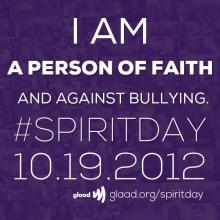
Twenty-five cents was all it took. It was like magic. The punches stopped and for the first time in a long time I felt what it feels like to be normal — to be safe, to be lovable, to live without a target on my back.
But even the transaction was not a guarantee of love.
Though I continued to bring quarters that fed the monster’s craving every day, after a while even their magic stopped working.
The torture started again on the playground after school.
I walked across the schoolyard and headed home, which was only a half-block away from the school. Suddenly I was surrounded by Alice and her goons. She taunted me and pushed me, then punched me. It didn’t stop. It became a ritual.
Soon, every day, armed with only my book bag, I would duck my head and make a beeline for my house and Miss Burton (the babysitter). And every day Alice and her bulldogs would hunt me down and taunt me and push me and punch me as I walked the looooong half-block home.
Mom asked one day what I was doing with all those quarters. When I told her, she marched up to the school and had it out with Miss Williams and then my principal. I was only in that school for one year.
Alice wasn’t the last bully I had to survive. There were others. There was Tracy in the fifth grade and two white girls whose names I’ve blocked out in eighth grade. For a long time I thought I must have an invisible target attached to my back.

Just one week after Pope Benedict XVI ended his successful visit to Lebanon, the country's most senior Catholic leader called for a United Nations resolution “that will ban denigrating religions.”
Meanwhile in Pakistan, the country's only Catholic cabinet member, Minister of Harmony Paul Bhatti, this week told an interfaith gathering in Lahore that he will press U.N. Secretary General Ban Ki Moon to pass a UN resolution that condemns "defamation and contempt against religions." Bhatti said "we must not allow anyone to break our harmony" between Christians and Muslims.
Both moves are understandable in light of increasingly popular efforts in predominantly Muslim countries to outlaw blasphemy or defaming religion. But they could prove problematic for the Vatican as it fights to protect the rights of Christian minorities around the world.
The debate suggests a widening gap between the Vatican's official position, which opposes such measures, and the day-to-day reality of Catholic leaders on the ground, who often feel compelled to support Muslim efforts to protect religious tenets and religious figures from defamation.

The difference between sex trafficking and freelance prostitution is who has the control and who is keeping the money, said prosecutor Lindsey Roberson, an assistant district attorney in New Hanover County. If a girl or a woman is being forced or coerced by a pimp to perform sex acts without monetary gain, that’s trafficking.
The North Carolina Coalition to Combat Human Trafficking ranks the state among the top 10 states for the problem. North Carolina’s three major highways connect much of the East Coast, and the state has a large transient military and farmworker population, and international seaports in the Cape Fear region.
In May, Roberson helped start a deferred prosecution pilot program for first-time offenders with prostitution charges, partnering with a local rape crisis center.
As a Christian, Roberson is also on the board of a new faith-based effort called the Centre of Redemption, which is scheduled to open in December to help pregnant teens and teen moms who are also trafficking victims.

A federal judge has temporarily blocked enforcement of a city law that was recently used to arrest Christian evangelists who were preaching on Bourbon Street during Southern Decadence, the annual celebration of gay culture in the French Quarter.
Part of the city's recently enacted "aggressive solicitation" ordinance orders people not to "loiter or congregate on Bourbon Street for the purpose of disseminating any social, political or religious message between the hours of sunset and sunrise."
"That's no longer in effect," American Civil Liberties Union lawyer Justin Harrison said.
U.S. District Judge Eldon Fallon granted a temporary restraining order on Sept. 21 and set a hearing for a preliminary injunction for Oct. 1.
Nine Christian preachers and activists were arrested in one well-publicized incident during the gay-themed celebration. One reportedly held a sign reading "God Hates Homos," and others shouted what witnesses characterized as slurs.

Amish bishop Samuel Mullet was convicted Sept. 20 of federal hate crimes and conspiracy for exhorting followers to forcibly shear the hair and beards of those who opposed his breakaway Ohio sect.
Mullet’s three sons, his daughter, and 11 other family members and followers from his ultra-strict Amish order 100 miles southeast of Cleveland also were convicted of conspiracy and hate crimes after a trial that attracted international attention.
The 66-year-old bishop could face life in prison for his crimes. U.S. District Judge Dan Aaron Polster scheduled sentencing hearings for Jan. 24.
Assistant U.S. Attorney Bridget Brennan said federal sentencing guidelines recommend a minimum of 17 1/2 years for the other 15 defendants given that their crimes involved violence and kidnapping.
But defense attorneys said the judge has the discretion to sentence some of Mullet’s followers to as little as time already served in jail.
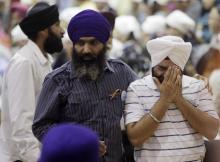
U.S. Sikhs are taking heart in a widely publicized Senate hearing on hate crimes and a pledge by the Justice Department to consider tracking hate crimes directed at their community.
The hearing, on Sept. 19, featured Harpreet Singh Saini,18, whose mother was one of six Sikh worshippers killed Aug. 5 when a gunman opened fire in their Wisconsin gurudwara (house of worship or, literally, "house of the guru").
“Senators, I came here today to ask the government to give my mother the dignity of being a statistic,” he told a subcommittee of the Senate Judiciary Committee. “My mother and those shot that day will not even count on a federal form. We cannot solve a problem we refuse to recognize.”
Sikhism, a monotheistic faith founded in South Asia, is the world’s fifth largest religion with an estimated 200,000 to 500,000 adherents in the U.S. Male Sikhs often keep their uncut hair bound up in a turban.
The Senate hearing, spurred by the Wisconsin shooting, brought more than 400 people to Capitol Hill, most of them Sikhs.